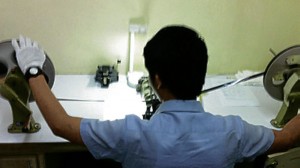Dream of a national archive need not become a nightmare

TECHNICIAN works on restoring one of the reels in the collection of the National Film Archive of the Philippines.
(Conclusion)
The big three studios—Sampaguita, LVN and Premiere—did not care for preserving their films; archiving was, simply, poor business practice. Stories are still told of a producer who sold black-and-white negatives because he was engaged in silver recovery. Another practice was using film to make New Year tooters.
Few exceptions
TV networks were not into archiving, either, until after Martial Law. Up till the 1970s, it was not unusual to recycle used video tapes by taping over them until they were no longer fit for broadcast. Thus, few programs before 1986 are extant.
What was wrong? The filmmakers and producers did not seem to believe in the cultural value of their own work. Film companies simply did not care. There were a few exceptions to the rule. Mike de Leon, for one, saw the distressing condition of the LVN collection when he became manager of the studio. He built the LVN film archive and tried to save remaining films by playing them using a projector and capturing the images onscreen with a Betamax recorder.
Article continues after this advertisementFernando Poe Jr. had the foresight to build his own library. Either he believed in the cultural and artistic value of his films, or he knew that they could still make money from residual runs on cable and DVDs, or both.
Article continues after this advertisementThe government cannot single-handedly assume the burden of sustaining a national film archive. All stakeholders should do their part, film companies, film scholars included. How can they help? One way is by lobbying in Congress to get financial support for the Film Development Council of the Philippines. Another is by supporting fund-raising strategies. During the Marcos years, for instance, 25 centavos were added to the cost of each movie ticket as flood tax. Something like this could be done for the national archive.
Ideal scenario
An ideal scenario is to have the support of both the government and the private sector. A few private corporations operate their own archives and museums (e.g. Ayala, Yuchengco, Lopez); their resources could be harnessed to work hand-in-hand with government. Or, private firms and institutions could run mini-archives under the FDCP. The FDCP simply can’t do the work on its own. So much audio-visual material needs to be preserved!
Private archives should be encouraged to each concentrate on a special film category—animated film for one, documentaries for another, regional cinema for yet another… And one can specialize in extra-filmic artifacts, like screenplays, posters and stills.
The Society of Filipino Archivists for Film (Sofia) will not merely be an interested bystander. It will continue to actively support the national archive and work towards creating awareness among industry people and the public about the value of developing a culture that values its audio visual heritage. There is no overestimating what a proud people can achieve. Hopefully, it all starts with a dream archive and not a nightmare.
(Clodualdo del Mundo, Jr. is the president of Sofia. He is a professor in the Department of Communication at De La Salle University.)